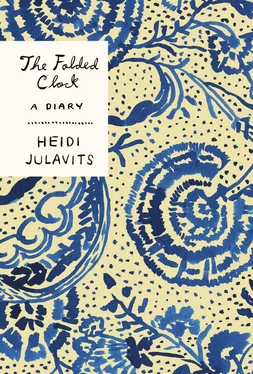Today my friend is arriving from London to help me pack. I am in Italy, I have been in Italy for a month, working at an art colony, and together she and I are going to a different part of Italy (also to work). I am often anxious about traveling alone, so she has been requested to keep me company and prevent me, in theory, from being anxious. What I forget is that she often makes me anxious when I am with her. She has a hunger for adventure so extreme that my usual hunger for adventure becomes, due to reactionary prudence, squelched. If she suggests we do something, then I know it is my job to wonder, Why is this probably a very bad idea?
The last trip my friend and I took together was to see and experience a building. I’d heard about this building for years; I’d even written a novel that took place in this building (that I’d never, save in my imagination, visited). While living in Germany — i.e., nearby, relatively — I decided it was time to finally see it. My friend agreed to accompany me.
This building, in order to be seen and experienced, however, required great effort. My friend and I had to fly to Zurich. We had to rent a car and drive, in winter, on terrible Swiss mountain roads. Our arrival was adventure enough for me. I was happy to stay inside for the rest of our trip. We were there to see and experience a building; let’s stay inside the building! (The building is a spa, but “spa” does not accurately describe the building. It is more accurately described as an art installation filled with water.) But my friend had other ideas. She wanted to explore the area. She’d found a place where we could ride a sled for six miles down an alp. She’d found a beautiful reservoir she wanted to visit. She wanted to leave the building we’d traveled all this way to see and experience, even though, she agreed with me, we’d never been inside a building like this in our lives. A building built for people. Why are most buildings not built for people? We asked ourselves this question over and over as a means of restating our astonishment. Most buildings are machines. They perform services. They provide heat and dryness and other basic functions that help with survival. This building provided so much more than survival. This building was like a bed or a sweater or an orchestra. This building took into account what your body wanted to do, feel, see, hear. After not too much time in this building we felt as though we’d taken hallucinogenic drugs. We simply could not believe how much this building intuited and addressed (and maybe, too, inflamed) every desire we possessed. It became overwhelming. We needed a break from the building. We needed a break from being so deeply understood.
Given that the six-mile sled run was closed (I tried not to seem excited by this news) we decided to drive to the reservoir. We asked a local man for directions. He warned that the roads, due to snow, were impassable. My friend pushed. Really? Were they really impassable? The man agreed to call the resident expert on road conditions. He would tell the expert the make of our car, and she, based on whatever fate algorithm she ran, would calculate our survival chances.
The woman said: with our car, we might be fine.
This did not sound like encouragement to me. To my friend, it sounded like encouragement. Because I am scared of appearing scared, I agreed with her interpretation. I would drive us to the reservoir.
No one should listen to experts. The road was ice-shellacked, the road was steep, the road was barely the width of our car; to the right of the road loomed a cliff so steep we could see only air. As often happens in situations when reality becomes terrifyingly stark, I avoid panic by allowing metaphor to take over. It’s not I am headed up a steep and slippery mountain road and I cannot turn around but My life is a novel written by an author who might want me to entertainingly die . My friend and I were no longer people in a car; we were characters in a plot. As characters in a plot, there was no escaping the fact that our story would have an ending. An outcome . Arguably, each day, at its conclusion, produces an outcome (arguably so does each minute, each second, each microsecond). But even when you’re just a person (not a character, or a person who feels like a character) your day will end, and using the most basic (i.e., starkest) accounting model, one of two outcomes will befall you — you will be alive or you will be dead. Some days the luxury of other outcomes can obsess you— Will he respond to my e-mail? Will I get enough sleep so that I can teach tomorrow? Other days refuse to permit distractions from the most fundamental outcome options: alive or dead. On these starker days, you can begin to worry as characters in a book should worry. Your outcome, however it gets decided, might not be designed with your best interests in mind.
Then we encountered the tunnel.
It was not clear, at first, that the tunnel was a tunnel. The road simply disappeared into the side of a mountain. Preventing us from pursuing the road was a metal door.
The road here also widened. At this single point in our journey, it was possible to turn around.
“I guess we have to turn around,” I said.
My friend thought otherwise. She’d read about this tunnel online. If we drove right up to it, she said, the door would open.
This seemed impossible. It was not. The door creaked and groaned as it rolled open, slat by slat.
We drove through. In the rearview mirror, I watched the door lower with the stuttering movements of a mechanism about to fail. The door resembled a jaw closing, and the tunnel, aptly, a digestive track. The stone undulated overhead, muscular and involuntary. Our outcome was being processed.
We drove a few kilometers. If we’d lowered the car windows, we could have touched the walls as we threaded the space between them. Finally we reached the exit, sealed shut by a second door. We approached at idling speed, hoping to God the thing would open. It did. We’d driven more deeply into the Alps but also more deeply into winter. The snow was abundant, the icicles thick and browned with age. We’d traveled through more than just solid matter to reach this place.
Behind us, the door closed.
We parked. We hiked, or tried to hike, but the roads were so slick we could only skid and fall. We eventually reached the reservoir. I tried to pretend I was enjoying myself. I wasn’t. My friend teased me about being such a worrywart, and I finally stopped feigning otherwise and admitted — I wanted to go back. I did not find it fun to wait for our outcome to be decided. I wanted to know our outcome, even though the variables were tilting us toward the less desirable of the basic two. Slippery roads. Mechanical doors that might or might not open. This situation reminded me not only of being in a novel but of writing one. It is equally no fun to be the author of scenarios where only a number of small outcomes are plausible. I knew the horror from both sides. In part this is why I’d told myself I was no longer, or not for the time being, writing novels. When writing novels I cannot seem to escape the trap of a plot. I imagine a fictional scenario and so quickly the march of consequence takes over. Things happen and so then other things must happen. I spend so much time working in the guts of this machine I feel less like a writer and more like the engineer of a high-performance vehicle. I am stuck perfecting the mechanics of happenings and coincidence. This is how plots take shape and achieve viability, at least when I’m wearing the hard hat — coincidence, recursion. In my defense, I am simply being mimetic. My life seems marked by a high degree of coincidence and recursion and synchronicity (as Durga the psychic confirmed). I know no other means to achieve plausibility.
Читать дальше












